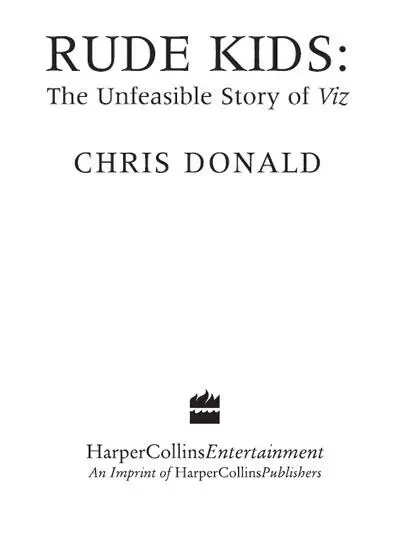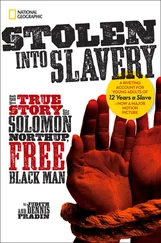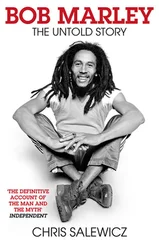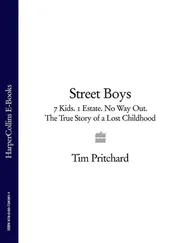
Cover
Title Page
Praise Praise ‘Chris Donald has written a brilliant book . . . an enthralling story . . . and as you’d expect from the creator of Billy the Fish and Roger Mellie, it’s also extremely funny.’ The Guardian – The Guide ‘If you haven’t read Chris Donald’s excellent book about that excellent magazine, get your copy now while stocks last.’ Evening Standard ‘Donald is lucid and engaging, and he’s affably disrespectful to the celebrities he meets when his life turns (relatively) showbiz.’ Q Magazine ‘The inside track on the why, who, how and what for of Britain’s greatest publishing phenomenon’ Loaded ‘a very good read’ New Statesman ‘Clunky’ Time Out
Dedication Dedication Dedicated to the memory of my mum, Kay, who would not have approved. Also to my dad, Jimmy, and my wife, Dolores. Oh, and ‘hi’ to my kids. Hi kids.
Introduction
1 The Beginning of Things
2 The Gosforth
3 Ghost Town
4 Celibacy and Drugs and Rock’n’Roll
5 Lunch in the Penthouse Suite
6 Four-Letter Comic on Public Cash
7 Onward Virgin Soldiers
8 The Fizzing of the Blue Touch Paper
9 A Ton of Money
10 An Inspector Calls
11 The TV Comedy of the Nineties
12 Chocolates? Maltesers
13 A Night at the Welsh BAFTAs
14 If It Ain’t Broke. . .
15 Pftt! Pftt! Pftt!
16 The Rabbit Hunter
17 Honk if You’ve Shagged Catherine Zeta-Jones
18 A Tale of Two Parties
19 A Minor Problem with Our Reservations
20 Me 1, Martin Peters 0
21 You Can’t Tie an Ice Cube to Your Beard
22 Funnier than Petrol
23 The Case of the Flying Bin Liner
24 The Leaving of Fulchester
25 The End
Appendix of Viz Cartoons
About the Author
Copyright
About the Publisher
‘Chris Donald has written a brilliant book . . . an enthralling story . . . and as you’d expect from the creator of Billy the Fish and Roger Mellie, it’s also extremely funny.’
The Guardian – The Guide
‘If you haven’t read Chris Donald’s excellent book about that excellent magazine, get your copy now while stocks last.’
Evening Standard
‘Donald is lucid and engaging, and he’s affably disrespectful to the celebrities he meets when his life turns (relatively) showbiz.’
Q Magazine
‘The inside track on the why, who, how and what for of Britain’s greatest publishing phenomenon’
Loaded
‘a very good read’
New Statesman
‘Clunky’
Time Out
Dedicated to the memory of my mum, Kay, who would not have approved.
Also to my dad, Jimmy, and my wife, Dolores.
Oh, and ‘hi’ to my kids. Hi kids.
Way back in 1992 Viz publisher John Brown suggested I write a blockbuster book telling the story of our magazine. And what a remarkable story it would be. In the space of a few years the tatty rag I’d started from my Newcastle bedroom, with a print run of 150, had grown to become the third best-selling magazine in Britain, with an astonishing circulation of 1.2 million, outselling Woman’s Own, Cosmopolitan and Hello! Only the Radio Times and TV Times sold more copies. Viz was a publishing phenomenon, revolutionizing the magazine market and making household names of Biffa Bacon, Johnny Fartpants and Buster Gonad. Its social effects had been dramatic too, launching words like ‘oo-er!’ ‘hatstand’ and ‘hairy pie’ into the national vocabulary, and paving the way for the great 1990s chauvinism revival through politically incorrect stereotypes like Sid the Sexist and the Fat Slags. Viz had even pre-empted the chronic decline of TV broadcasting standards through the creation of Roger Mellie the Man on the Telly.
As the founder and editor of Viz I had enjoyed a remarkable, rags-to-riches, roller-coaster ride of against-all-odds achievement and outrageous controversy. I’d won publishing awards, offended gypsies, been invited to tea by Prince Charles, and been taken in for questioning by officers of New Scotland Yard’s Anti-Terrorist Branch. Along the way I’d gained incredible insights into the world of light entertainment as I launched, almost single-handed, the hugely successful showbusiness careers of Harry Enfield and Caroline Aherne, to name but two. I’d caught my wife up to no good with Keith Richards in Peter Cook’s attic, I’d wined and dined the delightful Catherine Zeta-Jones, and I’d seen John Leslie’s cock in the showers at a celebrity football match. By any standards the book would have been a sensation – a bean-spilling, blockbusting, number-one best-seller.
But I turned to John and I said, ‘No’. I didn’t want to write a book at that stage. I didn’t need money – I was already a millionaire. I drove a BMW, holidayed at Sandy Lane, and bought ridiculous children’s bedroom furniture from Harrods. And I didn’t want to write a book that would crassly hit the shelves while Viz was at the peak of its popularity. Unlike Geri Halliwell and England rugby skipper Martin Johnson, for example, I don’t believe in the opportunist, cash-in autobiography. I prefer to see a fuller picture, a retrospective view. For me the most interesting part of Brian Clough’s autobiography would not be the glory days, the championship victories and European Cup success. I’d want to read the bit where he ended up asleep in a neighbour’s hedge, pissed as a fart. And if I was reading Rod Hull’s autobiography I wouldn’t want to hear him brag about knocking Michael Parkinson off his chair in the 1970s. I’d want to know what the fuck he thought he was doing up on that roof.
Unfortunately Rod Hull’s book can never be published, but I’m hopeful this one will. Because now that Viz has reached its twenty-fifth anniversary, and Roger Mellie has had a few problems with his own TV aerial, this seemed like a perfect time to write it.
Chris Donald
January 2004
CHAPTER ONE
The Beginning of Things
We were not rude kids to begin with. When I was ten my family moved to a nice terraced house in Jesmond, a leafy suburb of Newcastle. At the bottom of our new garden was a quiet road where we could play football relatively undisturbed by passing cars, and just across the road was a railway line. On the first day in our new home I joined in a game of football with some of my new neighbours. We’d not been playing for very long when the game suddenly stopped and everyone leapt up onto the fence alongside the railway. Not wishing to be the odd one out I joined in. Suddenly there was a loud throbbing sound from behind the trees and bushes to our left where the railway emerged from a cutting, and a filthy diesel engine crawled slowly into view, a hazy plume of black fumes rising above it. The iron railings in my hands vibrated as the train struggled up the bank, and as it passed us everyone shouted out the number written on the side of the driver’s cab. ‘8592!’ they all said. Naturally I joined in. ‘8592,’ I said, although I didn’t know quite why. From that moment on I was a train-spotter.
Coincidentally this was 1970, the year that The Railway Children movie was released. But there was no old gentleman waving at us from the last carriage – ours was a filthy goods train heading for the Rowntree’s sweet factory at Fawdon – and life for the railway children of Lily Crescent wasn’t quite as exciting as it was in the movie. There were no landslides or disasters to be averted. Instead we passed the time putting coins on the track and watching them get squashed, or smoking cigarettes in an old platelayers’ hut up the line. And rather than steal coal from the station yard and give it to my poverty-stricken mother, I stole Coke bottles from the back of the off-licence adjoining the railway and returned them the next day to collect a sixpence deposit.
Читать дальше













